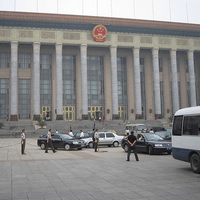China's fifth generation of leaders is coming of age at a critical juncture in the history of the People's Republic of China. Slated to assume power in 2012-2013, they will face both opportunities and challenges. Despite the current global economic and financial crisis, most projections of China's continuing rise have it assuming the No. 2 spot in the international pecking order by that time, with further enhanced economic and political influence, but also heightened expectations and demands for Beijing to take the lead in global and regional affairs. At the same time, domestic issues, from ethnic unrest to growing income disparity, raise serious concerns over socio-economic stability and could undermine the legitimacy of the Chinese Communist Party (CCP). Is China's fifth-generation leadership up to the challenges? What foreign and economic policies are likely to be adopted when the new leadership assumes power in the coming three to four years?
To answer that question, this article will provide a brief overview of the changing nature of Chinese leadership transition, the composition and factions in the fifth-generation leaders, and their likely policy outlooks and preferences. It will also examine whether policy differences could fracture the leadership at a time when party cohesion and unity, compromise and consensus-building, and pragmatism are essential to the continued viability of the collective leadership. It will then identify and discuss a number of critical foreign policy and domestic issues that the fifth-generation leaders are most likely to confront. These range from managing Sino-U.S. relations and reassuring Washington and China's neighbors of the peaceful intentions of its continuing rise to great-power status, to guiding the country through perhaps its most difficult yet critically important period since economic reform was launched 30 years ago. Among the gargantuan tasks the next generation of leaders faces are sustaining economic growth, reducing socio-economic disparity, and containing social and ethnic unrest, all while transitioning from an export-led growth model toward sustainable economic development driven more by domestic demand and consumption.
China's Fifth-Generation Leaders

